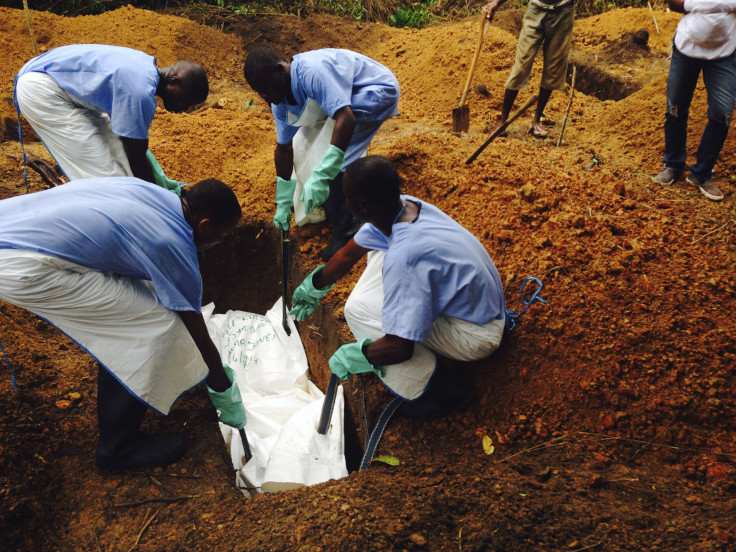Faith Healer Helped Spread Ebola In Sierra Leone: Report

As Ebola has traveled through the countries of West Africa killing hundreds in its path in its deadliest outbreak yet, a report has recently emerged suggesting that the spread of the virus in Sierra Leone began with a tribal faith healer’s claims of possessing special powers to cure the disease.
A famous herbalist, based in the eastern border village of Sokoma, who had herself contracted the virus helped it cross over from Guinea into Sierra Leone when people from all over the region came to her for a cure, Agence France-Presse, or AFP, reported Wednesday, citing a local doctor. The virus proliferated when mourners who attended her funeral were in turn infected.
"She was claiming to have powers to heal Ebola. Cases from Guinea were crossing into Sierra Leone for treatment," Mohamed Vandi, a top medical official from the hard-hit district of Kenema, told AFP, adding: "She got infected and died. During her funeral, women around the other towns got infected."
Ebola has killed more than 1,220 people since the beginning of 2014 when reports first emerged from southern Guinea from where it crossed over to Liberia and then on to eastern Sierra Leone in May. The deadly tropical virus turns people into near corpses with little brain function and motor control in the days before they die.
The disease, which is highly infectious and spreads through exposure to bodily fluids of infected people and the dead bodies of victims, has spread rapidly through West Africa, partly because of a local funeral rite that requires relatives to touch the dead victim, the report said. And, mourners from the tribal healer’s funeral spread out across the hills of eastern Sierra Leone, quickening the deadly cycle of infection and death.
Since the herbalist began inviting clients across the border with promises of a cure, 848 people have been infected and 365 lives have been claimed by Ebola in Sierra Leone alone, according to AFP. The outbreak turned into an epidemic on June 17 when it reached Kenema, Sierra Leone's third-largest city of 190,000, which had seen the world's highest incidence of Lassa fever -- another deadly tropical viral hemorrhagic disease -- years ago.
The first reported case of Ebola at the Kenema Hospital was of a woman who had a partial miscarriage and the hospital, which has one of the only Lassa fever isolation units in the world, set up a makeshift Ebola unit. However, the city's chaotic hospital system has proven inadequate to deal with the Ebola virus, which has been described in medical literature as a "molecular shark."
At least 12 nurses as well as Umar Khan, the country's leading Ebola specialist, who reportedly saved more than 100 lives, are among the 277 people who have succumbed to the deadly disease since the first case of Ebola showed up in Kenema Hospital. The deaths prompted protests from over 100 nurses who accused the hospital of mismanagement of the Ebola isolation unit.
"The nurses who lost their lives and those who got infected would never have gone in knowing that they would get infected," Vandi said, and added: "We are fighting a battle that is new. Ebola is new here and we are all learning as we go along."
Vandi also said that, "Wherever the Ebola virus strikes for the first time, there is a heavy toll on healthcare workers because they don't have experience with it."
Kenema Hospital has reportedly said that its staff training has vastly improved in recent weeks, with help from global aid agencies as well as the World Health Organization.
"These figures tell us one thing: Ebola is here with us and its impact on us is real," Maya Kaikai, a government minister for the eastern region, reportedly told a news conference in Kenema on Saturday, adding: "It is a disease that spreads very fast, without regard for academic or economic status, political affiliation, age, ethnic grouping, gender or religion."
© Copyright IBTimes 2024. All rights reserved.





















